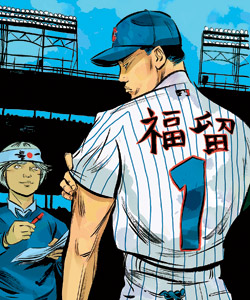|
|
Not long into an early-season batting practice, Kosuke Fukudome paused between the batting cage and the Cubs dugout to sign autographs for some young fans. The children alternately stared and smiled as Fukudome, fresh from Japan and just learning English, silently signed his name. Meanwhile, Japanese TV crews filmed the entire scene. "From our standpoint, he is in the spotlight and under pressure," explained Naoko Sato, a reporter for Nikkan Sports News and one of a dozen or so Japanese journalists assigned to cover the new Cub. "But I'm not sure he feels it. He's been in the spotlight since high school."
Several weeks into the season, Fukudome, 31, had yet to show that the aforementioned spotlight was affecting his play. The early returns on the Cubs' four-year, $48-million investment were good: He had landed a Sports Illustrated cover and was being touted as a potential National League Rookie of the Year.
The next day, his interpreter, Ryuji Araki, who shadows his every move, led me to the Cubs' media room so that I could interview Fukudome. I placed my digital recorder on a table a
few feet from the Cub. Then I thought better of it. The wiser move was to put the machine as close to his translator as possible. Fukudome seemed comfortable: smiling and acting interested in whoever was talking. He also had a memorable way of pronouncing his teammates' names aggressively and quickly: Soriano! Zambrano! Theriot!
Throughout our conversation, the newness of America and Major League Baseball seemed on the top of his mind. First, Fukudome pointed out the differences between the Cubs' clubhouse and that of his former team, the Chunichi Dragons. The Cubs players get far more attention from the team staff than do players for teams back home. In the States, players face their lockers when getting dressed, while Japanese players do the opposite.
The subject of food came up, too. Earlier, some Japanese reporters had told me that they had sent a somewhat homesick Fukudome to Mitsuwa, a grocery store in Arlington Heights, and Kuruyama, a restaurant in Elk Grove Village—two authentic Japanese spots they vetted while covering the former Chicago White Sox infielder Tadahito Iguchi.
Fukudome has bonded with the Japanese press assigned to cover him. "Can he talk about that?" I asked at one point. Fukudome leaned back in his folding chair to consider the question, chuckled to himself, and gabbed for almost a minute or so. All that followed from Araki was this: "Talking to Japanese media, around the locker, talking about something away from baseball, they might be able to find something personal. Just talking some random stupid stuff, that gives him comfort, and he can relax."
Overall, the new arrival said, he's felt welcome here. The early season has seen its fair share of Fukudome chants, T-shirts, banners, and Japanese headbands. What was he thinking during that first home game? I asked. "It's been very nice that all the fans have given him a very warm welcome," Araki said. "But sometimes their headband is upside down." A short while later, the rookie stood, jammed his hands in his sweatshirt pocket, and got ready to join his team.
Illustration: Kagan McLeod



